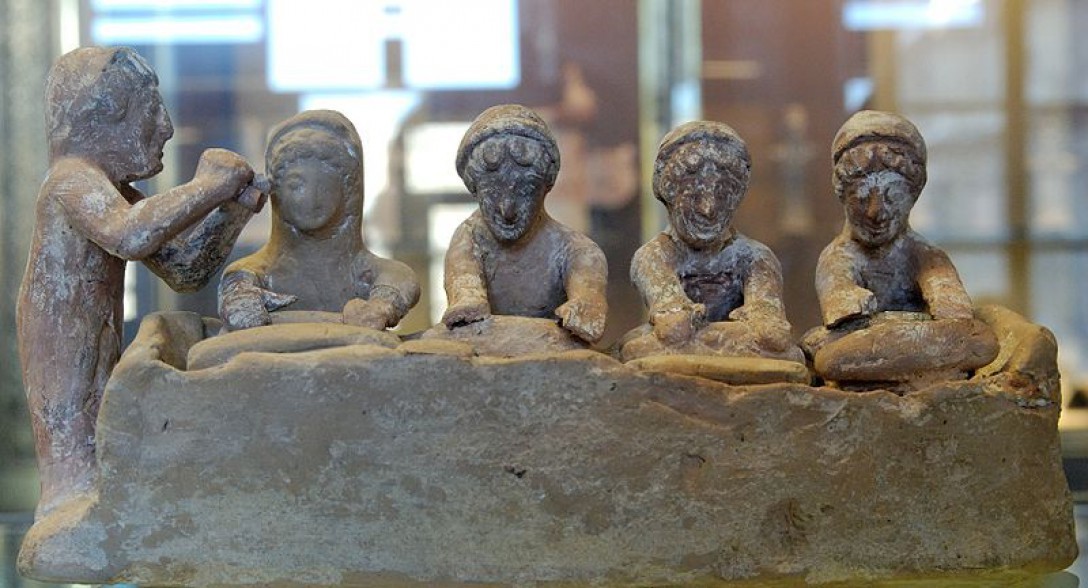In December of 1945, four months after the end of the 2nd World war, a New Zealand military ship called Mataroa (“Woman with large eyes” in Maori) sailed from Piraeus to Taranto, carrying more than 150 young Greeks. From there on “undependable trains, through a desolate Italy” (Castoriadis 1990), the Greeks were taken to Paris, where they were awarded scholarships by the French government.
The whole project- journey and scholarships- was masterminded by Octave Merlier, philellin, expert on the modern Greek language and director of the École Française in Athens (an organization sponsored by the French Foreign Office), with the support of the deeply democratic Deputy Director Roger Milliex and his wife Tatiana Gritsi-Milliex.
The idea was to save some of the most radical young university graduates, artists and business men from what soon turned into the bloody Greek Civil War. Because the people boarded on Mataora were mostly leftists and needed protection from the paramilitaries, not mention those who were Trotskists and needed protection from the Greek Communist Party.
Merlier’s primary objective, however, was to «assimilate in French cultural space and train as future representatives of French culture in Greece as many talented Greeks as possible», ensuring, at same time, the «influence of French language against the post-war rise of English» (Andricopoulou 2007: 29/ Gregory Paschalidis: Exporting National Culture: Histories of Cultural Institutes Abroad)
The journey from Piraeus to Paris lasted 8 days. The Greeks were young, enthusiastic and despite all difficulties and political differences they shared a common passion- to leave behind the impending civil war. They had no money, but cigarettes were a medium of exchange in post WWII Europe. Also, the breakfast on boat was absolutely delicious: butter, jam, oatmeal, sausages.
But
the difficult part of the journey was actually from Taranto to Paris.
The train station of Taranto had been bombarded, and they had to travel to Paris by those “undependable trains, through a desolate Italy”. Μοreover, there were no provisions for food, water and sleep, since train services were primitive.
However,
a few hours after the departure of the train they entered to the kingdom of magic… “on Christmas Eve or the day before they were passing through an Italian village hidden in the snow and the train made a stop. The Greeks of that village heard of that much spoken about ‘train with the Greeks’ and came to the station. They knew that the train was due to stop for half an hour, the usual time necessary for us to go to a restroom and drink some water — water was a huge problem, the conditions were totally primitive — and there those Greeks were, led by their priest — I have no idea how a priest existed there but I remember him as if he was present right now — they came to wish us Kala Christougenna (Merry Christmas), and the women brought cookies and other goodies, it was a very touching moment … darkness, snow, and suddenly to find ourselves among Greeks, some of them carrying Greek flags … and a priest … and small presents … it was truly unforgettable.” (Nelli Andrikopoulou “The journey of Mataroa, 1945” (Estia, 2007)
In those 30 magic minutes they had become part of Magna Grecia’s journey through the ages.
The majority of Matarora’s passengers later became distinguished intellectuals, scientists and artists in France. Many of them became internationally famous like Cornelius Castoriadis, Kostas Axelos, Kostas Papaioannou, Mimika Kranaki (philosophers) Nikolaos Svoronos (historian), Andreas Glenos (doctor), Aristomenes Provelengios, Athanasios Gattos, Takis Zenetos (architects), Iannis Xenakis (composer and architect) Elli Alexiou (writer), Matsi Hatzilazarou (poet), Nelli Andrikopoulou (artist) etc. It is obvious that Octave Merlier’s huge operation was also the beginning of the brain drain from Greece.
PETTULI**
Pettuli are typically Pugliese golden fried pieces of dough, traditionally eaten at the Christmas season. The tradition says that they are given by baby Jesus to the poor.
Pettula means small pie. The word came from the Greek pittoula= small pie which derives from the ancient Greek pitta.)
7 cups all purpose flour
warm water
1 tsp salt
25 gr live yeast
1 tbs sugar
olive oil for frying
Combine the flour, salt, sugar, yeast (dissolved in a glass of warm water) and enough warm water to make a little bit moist, sticky and smooth dough. Leave the dough in a warm place to rise.
Heat olive oil, take a bit of dough with a spoon and fry. (Or sink you hand in the dough and squeeze it . Dip your fingers in cold water to keep the dough from sticking to them.) The pettuli will puff up immediately. After 30 seconds turn them on the other side and let them fry to golden brown. Remove and drain them on absorbent paper.
Serve them sprinkled with sugar or honey or vincotto (petimezi, grape molasses). Or you can eat them with a meal instead of bread. There are also savoury versions with tomatoes, vegetables, fish, mashed potatoes, sweet potatoes or with pumpkin.
Video: a woman from South Italy makes the Pettole.
*Taranto, ancient Greek Taras, was founded by Spartan settlers on 706 b.C. Three centuries later, it was the most important city of Magna Grecia. Today, there are nine towns near Taranto populated by families who still speak a Greek dialect. The area is known under the name of Grecia Salentina.
**Brindisi, Taranto: pettuli; Lecesse: pittule; Potentino: pettole






IT IS SO MOVING TO ME WHEN I COME ACROSS ANYTHINING FROM GREEK HISTORY…..I DO LOVE HISTORY IN GENERAL.
Μαρία, σου εύχομαι ό,τι καλύτερο γι’ αυτή τη χρονιά!
Ozlem, πολύ όμορφο. Ευχαριστώ!!
thank you for this bit of history – it’s enriched my knowledge of my own country
χρονια πολλα και ευτυχισμενο το νεο ετος
http://www.youtube.com/watch?v=pUR_zqkNmXc&feature=related
Sol Invictus!
Ευχαριστώ Κατερίνα μου. Σου εύχομαι ό,τι καλύτερο για σένα και τους αγαπημένους σου.
Πολύ όμορφη η ιστορία που μας διηγήθηκες. Σου εύχομαι Καλά Χριστούγεννα με υγεία, αγάπη και χαρά σε σένα και στην οικογένειά σου.